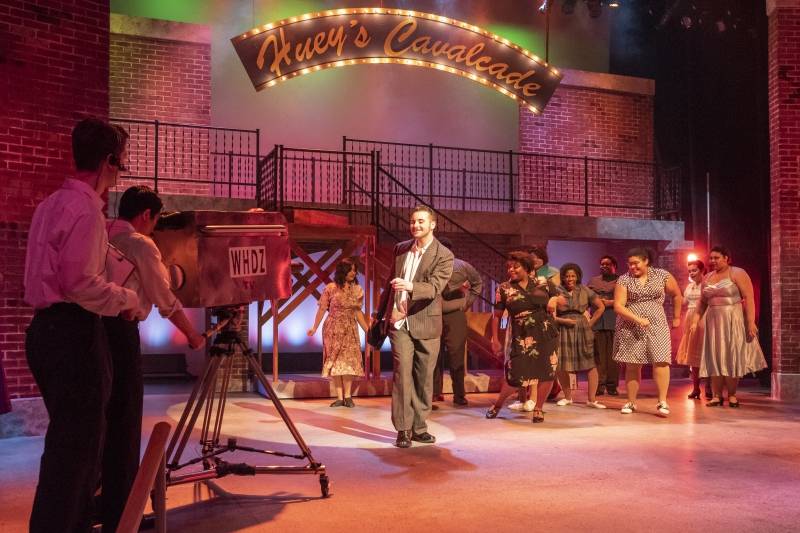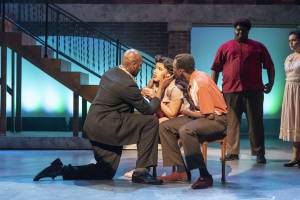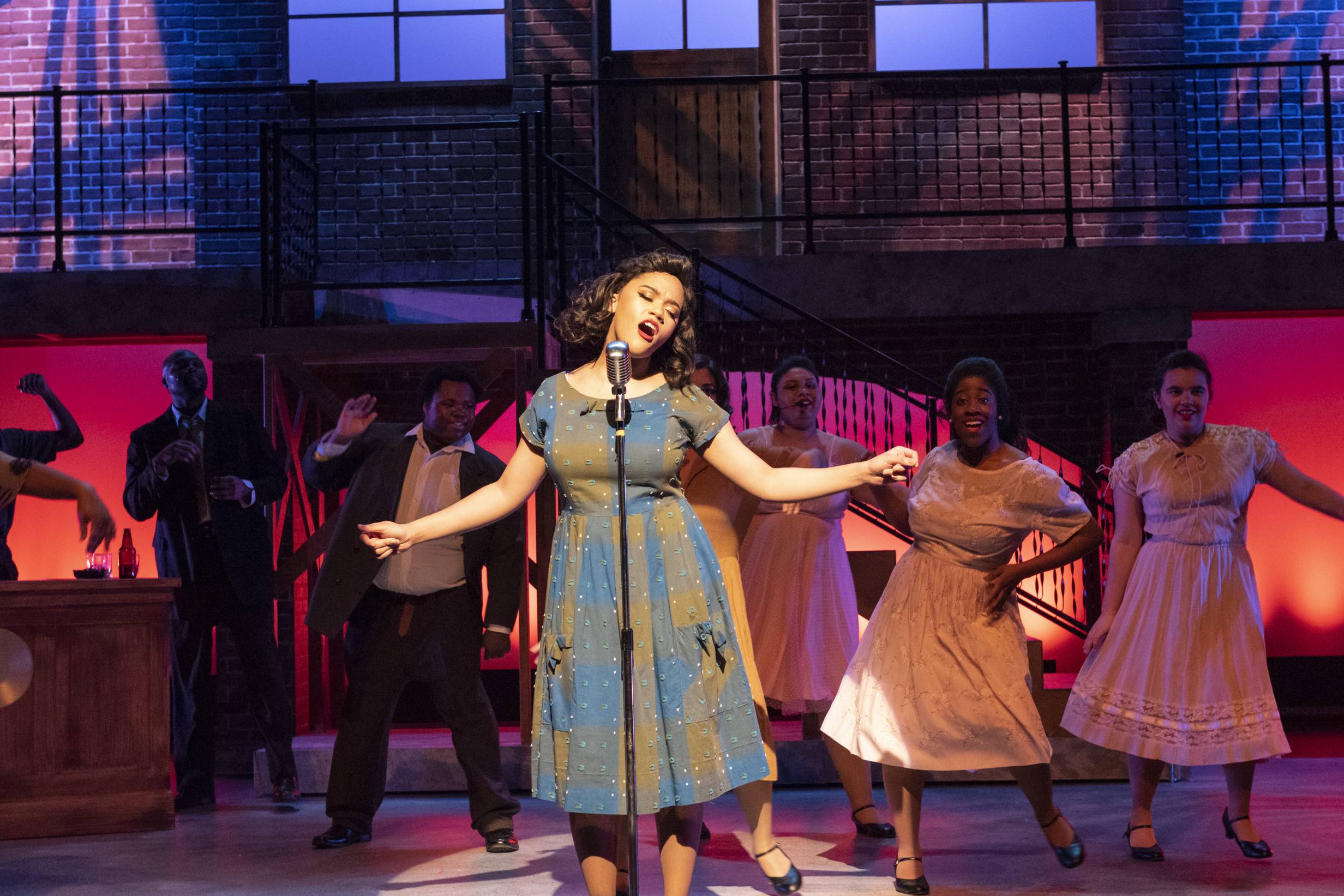Both music and theatre have an uncanny ability to reach across time and teach us about life’s journey and the world around us. Sure, certain songs or shows are made as an escape, something that offers fun and mindless entertainment. Art, meaningful music, and theatre engage the world, not just the beauty, but also the imperfections. Most of all, courageous music and theatre attempts to pull the wool from our eyes, and place all that is wrong with the world smack dab in front of us. If we are willing to open our ears, then our eyes can be opened enough to see.
At the forefront of the story was explicit racism of mid-century America. I find it incredibly hard to place this type of racism into another era, when the battle against said racism has not ended and has simply slithered into the shadows permeating the system that this country runs on. But implicit in songs such as “Everybody Wants to Be Black on Saturday” and subtle jokes sprinkled throughout the show are the issues of the commodification of Black music and cultural appropriation. With that said, I will still focus on the performances (I will try my hardest to cover everyone but doing so may prove difficult with such a large cast), but I cannot ignore the story intimately connected to those performances.

Zoe Branch—an amalgam of Janelle Monae, Nina Simone, and Tessa Thompson on the stage—as Felicia Farrell and Jake Fava as Huey Calhoun are stunning.
Branch’s first solo was slightly shaky, but I contribute that to opening night jitters more than her skill on stage. As the story unfolded, I hung on every note of Branch’s beautiful voicem, especially when she sang in her full voice. It is my belief that the sign of skilled acting lies in what one can do with secondary acting whether in between lines or without any lines whatsoever. More can be said in reactions than the delivery of lines and Branch’s performance is a fine example of this fact. Felicia’s hopes, agony, confusion, joy, and passion could be seen in Branch’s face and the way she interacted with her scene partners.
There is something about Blues that calls to me and is, like R&B to Huey, the music of my soul. Blues, at its core, speaks of life and life’s struggles. My favorite Blues musicians create art that reaches the soul and stirs powerful emotions. In my opinion, this quality of Blues comes through in the artist’s voice. From the moment the first note slipped from Fava’s mouth I felt the character’s soul and emotions; an absolutely perfect casting.
Branch and Fava’s chemistry illustrated that the tension of Huey and Felicia’s relationship not only came out of the illegal nature of their love, but of the commodification of Black music. Yes, Huey truly loved Felicia, there is no doubt about that, but in Fava’s performance we see how swept up Huey became in the claiming the mantle of bringing Black music to the masses.
Outside of the lead roles, the strength of the show was supported by the superb supporting cast members and ensemble.
 Prince Robertson (Delray) shines as the protective and skeptical older brother of Felicia. At first glance, one could surmise that is all there is to Delray, but such a sentiment would be short-changing him. Delray represents the skepticism and fear of the continued stealing of Black music and culture and the consistency at which Black musicians create music out of their own experiences just to see it taken because it “changes” something in the white population. Robertson carried this role with charisma and strength.
Prince Robertson (Delray) shines as the protective and skeptical older brother of Felicia. At first glance, one could surmise that is all there is to Delray, but such a sentiment would be short-changing him. Delray represents the skepticism and fear of the continued stealing of Black music and culture and the consistency at which Black musicians create music out of their own experiences just to see it taken because it “changes” something in the white population. Robertson carried this role with charisma and strength.
As Gator, who has not spoken for most of his life after witnessing his father’s lynching, Preston Roseborough tackles the challenge of not speaking or singing one line for nearly the entire first act with confidence. Roseborough’s secondary acting even contributes to a few of the more memorable comedic scenes while on stage with Fava and Joe Jeffries (Bobby). The moment in which Gator finally lets carefully chosen words escape his lips, Roseborough’s vibrato and shaky voice add deep emotion to an already intense moment.
Above all other supporting performances was the hilarious way in which Joe Jeffries, as Bobby, steals every scene he is in. His charm and contagious energy made Bobby, to be honest, my favorite character.
Jenny Gleason as Gladys, Huey’s mother, and Peter Barrett as Mr. Miller, the radio producer that gives Huey a chance and the typical “I’m a white man that loves black music as long as it makes me money” trope offer charming and funny performances. Their performances and characters are much more important than meets the eye.
All in all, the entire cast from top to bottom gave stellar performances. I am a firm believer that there are never small roles. Memphis would not have been a success without the casting of every single person on that stage, especially those who were members of the ensemble.
Last, but never the least, one can never leave out the band. Shows are nothing without them, and Memphis was no exception.
Of course, like with any show, there were imperfections. However, with this production of Memphis these imperfections were not the fault of the director or the cast, but the script. How quickly Felicia falls for Huey is a tad bit problematic. Sure, romance is always condensed to fit the pace of a show, but something did not feel right at first. Additionally, Gladys and Mr. Miller’s transformations proved problematic. The transformation itself did not, but the problem I had was how we were left with her character. As dramaturg Latrelle Bright and various cast members noted during the show’s talk back, making a difference as a member of the white majority does not stop with a “seeing the light” moment. If we continue to believe the journey ends at changing our minds about minorities, nothing will ever change. That is where the journey begins. I wish we could have seen that.
While Memphis is hilariously entertaining, and filled with—as Huey Calhoun would describe it—fantastical music, there is much more beneath the rock ’n roll, R&B, and Blues riffs. Sometimes when we listen to music, we find ourselves swept up in a good beat or hook, and we just listen. We don’t truly hear what we are being taught. Memphis is more than just a fun time. It is a show that must be truly heard, especially in this town—a town that at most times hides behind the guise of “not having problematic issues” because of the university, and tends to ignore the foundations it has been built on. Don’t just listen. Hear the cries of a story that must continue to be told most especially during the times we live in.
_______________________________________________________________________
Memphis, directed by Rick Orr [correction] Jeff Dare, is playing in the Harold and Jean Miner Theatre at Parkland College until April 22. For tickets and more information, click here.
Photos by Bryan Heaton.








